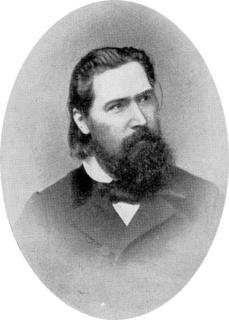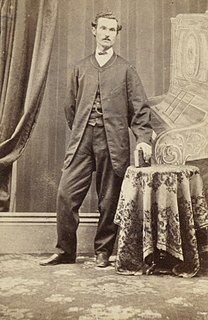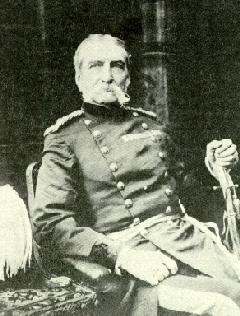Related Research Articles

Georg Balthazar von Neumayer, was a German polar explorer and scientist who was a proponent of the idea of international cooperation for meteorology and scientific observation.

The Burke and Wills expedition was organised by the Royal Society of Victoria in Australia in 1860–61. It consisted of 19 men led by Robert O'Hara Burke and William John Wills, with the objective of crossing Australia from Melbourne in the south, to the Gulf of Carpentaria in the north, a distance of around 3,250 kilometres. At that time most of the inland of Australia had not been explored by non-Indigenous people and was largely unknown to the European settlers.

The Honorable DrJohn Macadam, was a Scottish-Australian chemist, medical teacher, Australian politician and cabinet minister, and honorary secretary of the Burke and Wills expedition. The genus Macadamia was named after him in 1857. He died in Australia aged 38.

Baron Sir Ferdinand Jacob Heinrich von Mueller, was a German-Australian physician, geographer, and most notably, a botanist. He was appointed government botanist for the then colony of Victoria by Governor Charles La Trobe in 1853, and later director of the Royal Botanic Gardens, Melbourne. He also founded the National Herbarium of Victoria. He named many Australian plants.

Flagstaff Gardens is the oldest park in Melbourne, Victoria, Australia, first established in 1862. Today it is one of the most visited and widely used parks in the city by residents, nearby office workers and tourists. The gardens are notable for their archaeological, horticultural, historical and social significance to the history of Melbourne.

Clement Hodgkinson was a notable English naturalist, explorer and surveyor of Australia. He was Victorian Assistant Commissioner of Crown Lands and Survey from 1861 to 1874.

Robert O'Hara Burke was an Irish soldier and police officer who achieved fame as an Australian explorer. He was the leader of the ill-fated Burke and Wills expedition, which was the first expedition to cross Australia from south to north, finding a route across the continent from the settled areas of Victoria to the Gulf of Carpentaria. The expedition party was well equipped, but Burke was not experienced in bushcraft. A Royal Commission report conducted upon the failure of the expedition was a censure of Burke's judgement.

William John Wills was a British surveyor who also trained as a surgeon. Wills achieved fame as the second-in-command of the ill-fated Burke and Wills expedition, which was the first expedition to cross Australia from south to north, finding a route across the continent from the settled areas of Victoria to the Gulf of Carpentaria.

John King was an Irish soldier who achieved fame as an Australian explorer. He was the sole survivor of the four men from the ill-fated Burke and Wills expedition who reached the Gulf of Carpentaria. The expedition was the first to cross Australia from south to north, finding a route across the continent from Melbourne in Victoria to the Gulf of Carpentaria in Queensland.

Alfred William Howitt, , also known by author abbreviation A.W. Howitt, was an Australian anthropologist, explorer and naturalist. He was known for leading the Victorian Relief Expedition, which set out to establish the fate of the ill-fated Burke and Wills expedition.

Johann Wilhelm Theodor Ludwig von Blandowski, known as William Blandowski, was a German explorer, soldier, zoologist and mining engineer of Polish roots, he is most famous for his exploration of the Murray and Darling Rivers in Australia.

The Royal Society of Victoria (RSV) is the oldest scientific society in the state of Victoria in Australia.

Lieutenant General Sir Andrew Clarke, was a British soldier and governor, as well as a surveyor and politician in Australia.

Ludwig Becker was a German artist, explorer and naturalist. He was born in Rödelheim near Frankfurt am Main. He moved to Australia in 1850, and was a member of the ill-fated Burke and Wills expedition. He died at the expedition's camp on the western bank of Koorliatto Waterhole, Bulloo River in 1861.

The Taradale Viaduct is a large wrought iron box girder bridge over Back Creek at Taradale, Victoria on the Bendigo Railway in Victoria Australia. It was erected as part of the Melbourne, Mount Alexander and Murray River Railway between 1858 and 1861, and was at the time one of the largest rail bridges built in Australia.
Albert Purchas was a prominent 19th century architect and surveyor in Melbourne, Australia.

Burke and Wills Camp B/CXIX is a heritage-listed campsite at Burke and Wills Access Road, Normanton, Shire of Carpentaria, Queensland, Australia. It is also known as Walker's Camp. It was added to the Queensland Heritage Register on 14 August 2008.

Dr Ludwig Becker's Grave is a heritage-listed grave at Molesworth Station, by the Bulloo River, Bulloo Downs, Shire of Bulloo, Queensland, Australia. He was buried in 1861. It was added to the Queensland Heritage Register on 5 August 1994.

The Burke, Wills, King and Yandruwandha National Heritage Place is a heritage-listed historic precinct on the Birdsville Track, Innamincka, South Australia, Australia. It was added to the Australian National Heritage List on 22 January 2016.

Dr. Hermann Beckler was a German doctor with an interest in botany. He went to Australia to collect specimen for Ferdinand von Mueller and served as medical officer and botanist for the Victoria Exploring Expedition in 1860.
References
- ↑ Encyclopedia of Australian Science, 2010, Corporate entry, Philosophical Institute of Victoria (1855 - 1859)
- ↑ The Royal Society of Victoria from then, 1854 to now, 1959 by R. T. M. Pescott
- ↑ "The Exploration Committee: 1857". Burke and Wills Web, www.burkeandwills.net.au. Retrieved 15 September 2010.
- ↑ Alphabetical List of Members 1854-1872 Science and the making of Victoria, Australian Science and Technology Heritage Centre and The Royal Society of Victoria 2001
- ↑ Office Bearers of the Philosophical Institute of Victoria Burke & Wills Web : the digital research archive